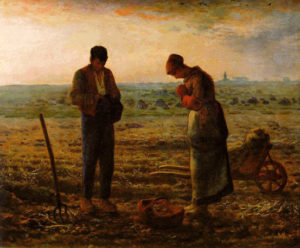28 February OS 2018: Tuesday of the Fourth Week of Lent; S. Proterius of Alexandria, Bishop and Martyr; S. Basil the Confessor
The first reading at Vespers today is Genesis 9: 8-17.
God’s makes His after-Flood covenant with a single household: “And behold, I establish my covenant with you, and with your seed after you, and with every living soul that is with you, of the fowls and of the cattle, and with all the wild beasts of the earth, as many as are with you, of all that came out of the ark.”
Noah is the paterfamilias, the patriarch, of a farming family, of wife and sons and sons’ wives, of the domestic and wild beasts in their care and under their authority. God chose a family of animal husbandmen, along with their “critters” – not a government or an army or a political party or a business or a city – to be the foundation of all the future of the earth. Governments, cities, and all the rest are part of God’s plan for society, too, but they are not the foundation. The foundation is the family, and, to be more precise, husband and wife, their children, their extended family, and ultimately their posterity, caring for animals and tending the soil.
All the Scriptures, all the Fathers, and all the best philosophers of all history testify that the natural family – man and wife with their offspring, living on their own land and caring for their own needs – is the setting most conducive to a moral and pious life. Life in the city, detached from nature, always tied to commerce – and often, worse, to moneylending – naturally tends to the breakup of the family and to every vice, which must be fought at every step, as any bishop of any great metropolis in Christian history can testify.
“Economics” in today’s parlance means some kind of abstract system or mathematical game pretending to offer the best way of dealing with the production, distribution, and consumption of goods and services by abstract beings called “individuals,” a kind of human being which never exists in nature except as an extreme neurotic (at best) or a sociopath (at worst). The Greek original of “economy,” oikonomia, however, does not mean something so removed from reality. It means, literally, the “law of the household,” the understanding of how families govern themselves and their material substance. All true understanding of economics for larger groups – communities, nations, mankind – must be built on this. Edmund Burke said that the true purpose of politics is for a man to be happy at home. The same is true of economics.
Great Lent is a great time to get back to basics. How does our family life conform to the law given by Scripture, to the example of our pious ancestors, to the God-given, natural reality of what a family is? Given our circumstances, what can we do to recover the law of the household, the life of the family? We cannot all “go back to the land” (though more of us could than we think); we have inherited the highly artificial system of things that dominates us, and only a mighty revolution in the current life of man will change that. But we can resolve to do a few things:
- Always say family prayers, every day.
- Always have a family meal, every day.
- Grow some of our own food and care for some dumb creatures, together.
- Curb our appetites, pay our own way, and avoid debt.
Let’s start there. If we manage this short list, it will make for a profitable Lent!

